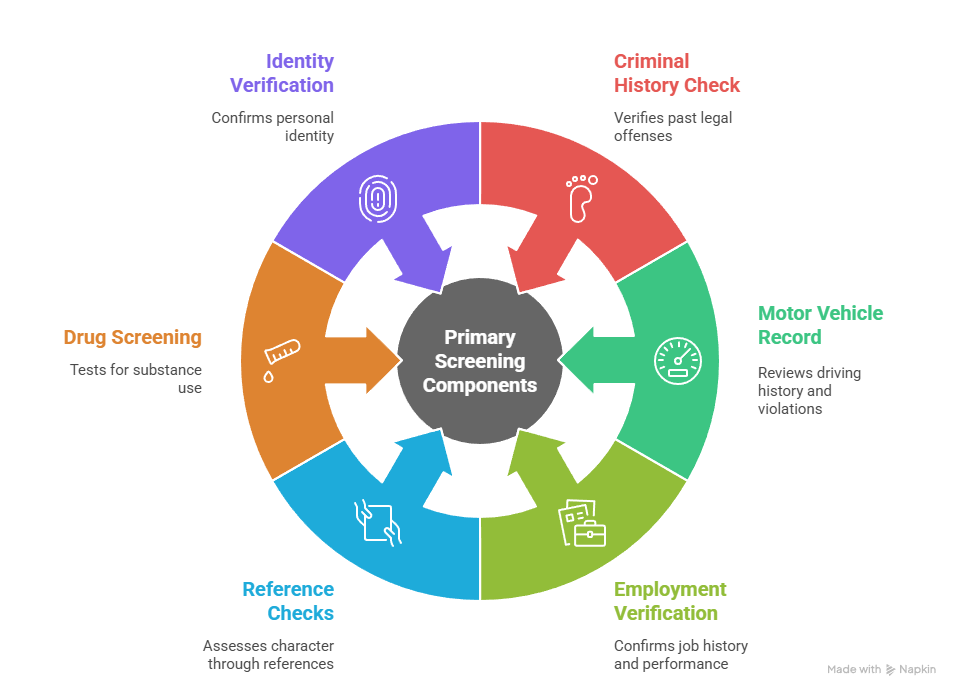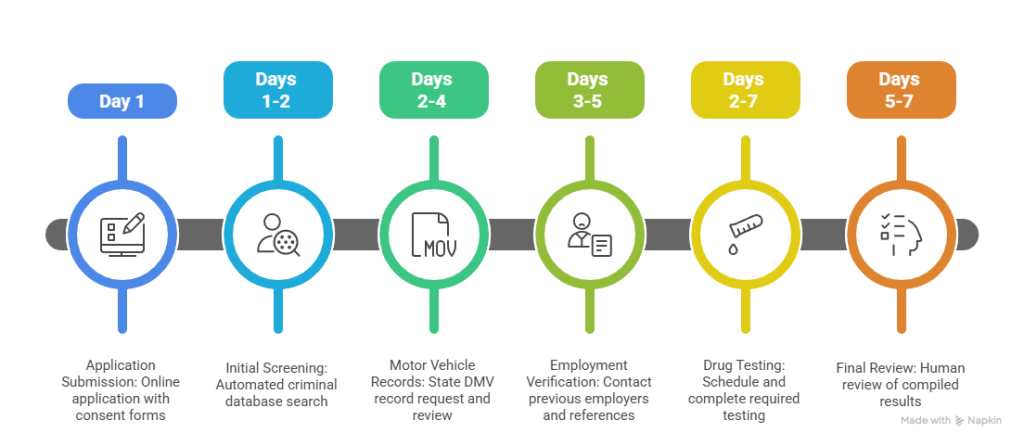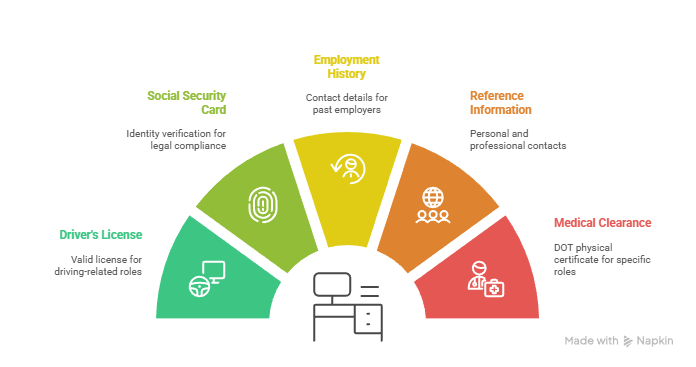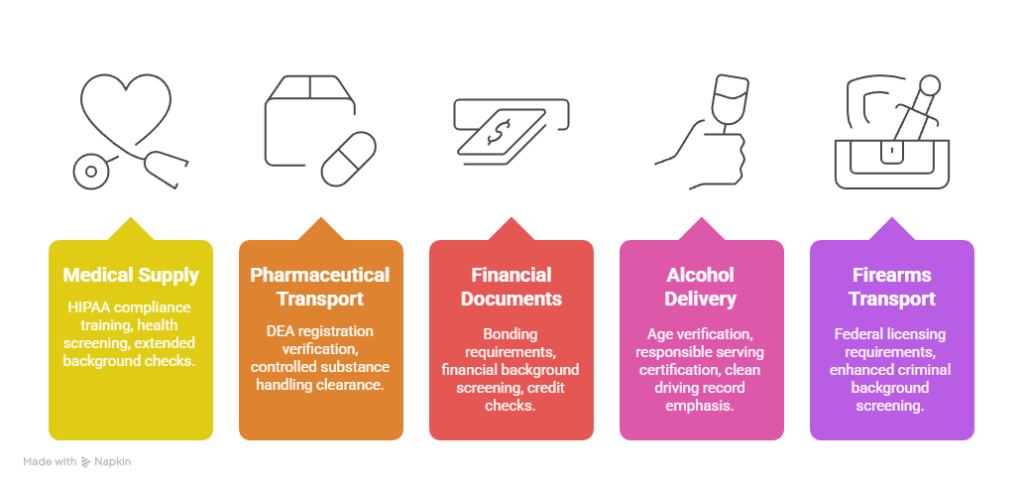Delivery driver background checks have become increasingly comprehensive in 2025, with major carriers like Amazon DSP, FedEx Ground, and USPS contractors implementing stricter screening standards that typically examine criminal history, driving records, and employment verification over a 3-7 year period. Understanding these requirements is crucial for job seekers entering the growing delivery industry and employers seeking compliant hiring practices.
Key Takeaways
- Most delivery companies require clean driving records with no more than 2-3 moving violations in the past 3 years and no DUI/DWI convictions within 5-10 years.
- Criminal background checks typically focus on felonies within the last 7 years, with automatic disqualification for violent crimes, theft, and drug trafficking offenses.
- Employment verification, reference checks, and drug screening are standard components of delivery service screening processes across major carriers.
- Background check processing times range from 2-10 business days, with some companies offering conditional employment pending results.
- Certain disqualifying factors may be appealable through company-specific review processes, especially for older or non-relevant offenses.
- Independent contractor positions often have more flexible requirements compared to employee delivery driver positions at the same company.
What Companies Look for in Delivery Driver Background Checks
Modern courier background check processes examine multiple aspects of an applicant's history to assess reliability and safety. Delivery service screening has evolved significantly since 2020, with companies implementing more sophisticated verification systems. Package delivery requirements now encompass criminal history, driving records, employment verification, and sometimes credit checks.
Primary Screening Components:

- Criminal History Check: Felony convictions, misdemeanors involving theft or violence, drug-related offenses
- Motor Vehicle Record (MVR): Traffic violations, license suspensions, DUI/DWI history, accident records
- Employment Verification: Previous job history, reason for leaving, performance records
- Reference Checks: Personal and professional references, character assessment
- Drug Screening: Pre-employment testing, random testing policies for ongoing employment
- Identity Verification: Social Security verification, address history confirmation
Companies prioritize safety and reliability when evaluating candidates. The delivery industry's focus on customer interaction and valuable package handling drives these comprehensive screening requirements.
Criminal background checks typically examine records from the past seven years. However, some carriers extend this timeframe for serious offenses like violent crimes or felony theft. Most companies use automated systems to flag potential concerns before human review.
Major Delivery Companies and Their Specific Requirements
Different carriers maintain varying standards for their delivery driver background check processes. Understanding company-specific requirements helps job seekers target appropriate opportunities. Consequently, researching individual company policies saves time during the application process.
Amazon Delivery Service Partners (DSP)
Amazon DSP contractors typically conduct 7-year criminal background checks and 3-year driving record reviews. The company prohibits hiring drivers with violent felonies, theft convictions, or DUI incidents within 5 years. Additionally, drug testing includes pre-employment screening and random testing during employment.
DSP-Specific Requirements:
- Age Minimum: Must be at least 21 years old for most positions
- License Requirements: Valid driver's license for at least one year
- Vehicle Restrictions: No commercial driver's license required for standard delivery vehicles
- Physical Requirements: Ability to lift 50 pounds repeatedly throughout shift
- Technology Skills: Comfortable using handheld delivery devices and smartphone apps
Amazon also requires successful completion of their delivery training program. This program covers safety protocols, customer service standards, and proper package handling procedures.
FedEx Ground and Express
FedEx Ground requires clean driving records with no more than 2 moving violations in 36 months. Criminal history checks extend back 7 years, with automatic disqualification for felonies involving theft, violence, or controlled substances. Package delivery requirements include passing a DOT physical examination for certain positions.
FedEx Express maintains stricter standards due to airport access requirements. Consequently, Express drivers undergo additional security screenings including TSA background checks. Moreover, Express positions often require longer employment verification periods extending back five years.
UPS and UPS Ground
UPS maintains strict standards with 10-year criminal background checks and comprehensive driving record reviews. The company considers factors like conviction type, time elapsed, and rehabilitation efforts. Employment verification extends back 3 years with required manager references.
UPS Background Check Components:
- Extended Criminal History: 10-year lookback period for all felony convictions
- Driving Record Analysis: Comprehensive review including out-of-state violations
- Employment Verification: Direct supervisor contact for previous three positions
- Reference Requirements: Minimum of two professional references with phone verification
UPS also conducts periodic re-screening of existing employees. This ongoing monitoring helps maintain safety standards throughout employment.
USPS Contract Delivery Services
USPS contractors follow federal background check requirements due to mail handling responsibilities. These checks include fingerprinting, extensive criminal history reviews, and postal-specific disqualifiers. Furthermore, contractors must pass federal suitability standards similar to postal employees.
| Company | Criminal Check Period | Driving Record Period | DUI Lookback | Drug Testing | Special Requirements |
| Amazon DSP | 7 years | 3 years | 5 years | Pre-employment + Random | Age 21+ minimum |
| FedEx Ground | 7 years | 3 years | 7 years | Pre-employment | DOT physical |
| UPS | 10 years | 5 years | 10 years | Pre-employment + Random | Manager references |
| USPS Contractors | 10 years | 5 years | 10 years | Pre-employment | Fingerprinting |
Timeline and Process Steps
The delivery driver background check process follows predictable stages, though timing varies by company and location. Most courier background check procedures take 3-7 business days for completion. However, understanding each phase helps candidates prepare appropriately.
Standard Process Timeline:

- Application Submission: Online application with consent forms (Day 1)
- Initial Screening: Automated criminal database search (Days 1-2)
- Motor Vehicle Records: State DMV record request and review (Days 2-4)
- Employment Verification: Contact previous employers and references (Days 3-5)
- Drug Testing: Schedule and complete required testing (Days 2-7)
- Final Review: Human review of compiled results (Days 5-7)
Delays can occur during employment verification or when additional documentation is required. Some companies offer conditional employment pending final background check clearance. Nevertheless, most applicants receive results within one business week.
Companies typically notify candidates of background check initiation within 24 hours of application submission. Electronic consent forms speed the process significantly compared to paper-based systems. Additionally, many employers provide online portals for tracking screening progress.
Required Documentation
Applicants must provide specific documents to facilitate the screening process. Having these materials ready accelerates the courier background check timeline and demonstrates professionalism to potential employers.
Essential Documents:

- Valid Driver's License: Current, unexpired license from state of residence
- Social Security Card: Original or certified copy for identity verification
- Employment History: Contact information for previous 3 employers, including supervisor names and phone numbers
- Reference Information: Personal and professional references with current contact details
- Medical Clearance: DOT physical certificate if required for position type
Missing documentation causes the most common delays in background check processing. Consequently, gathering these materials before applying saves valuable time. Moreover, having backup contacts for previous employers prevents verification delays.
Expedited Processing Options
Some delivery companies offer expedited background check processing for qualified candidates. These fast-track options typically cost additional fees but reduce waiting times to 24-48 hours. However, expedited processing may not include all standard verification components.
Fast-Track Limitations:
- Reduced Scope: May exclude detailed employment verification or reference checks
- Higher Costs: Companies often pass expedited processing fees to candidates
- Limited Availability: Not offered during peak hiring seasons or high-volume periods
Common Disqualifying Factors
Understanding potential disqualifiers helps job seekers assess their candidacy realistically. Most delivery companies maintain similar standards, though some offer appeal processes for borderline cases. Furthermore, package delivery requirements prioritize public safety and asset protection.
Automatic Disqualifiers:
- Violent Crimes: Assault, battery, domestic violence, weapons charges within lookback period
- Theft Offenses: Burglary, robbery, shoplifting, embezzlement, or fraud convictions
- Drug Trafficking: Distribution, manufacturing, or sales of controlled substances
- Serious Traffic Violations: DUI/DWI, reckless driving, hit-and-run incidents
- License Issues: Suspended, revoked, or expired driver's license at time of application
- Employment Terminations: Firing for theft, violence, safety violations from delivery positions
Potentially Disqualifying Factors:
- Multiple Moving Violations: More than 3 tickets within 3 years may raise concerns
- Misdemeanor Drug Possession: Recent convictions may affect eligibility depending on company policy
- Employment Gaps: Extended periods without work require explanation and verification
- Poor References: Negative feedback from previous employers regarding reliability or performance
- Financial Issues: Bankruptcy or significant debt for cash-handling positions
Most companies evaluate borderline cases individually, considering rehabilitation efforts and time elapsed. Additionally, some employers provide conditional hiring opportunities for candidates with minor issues.
Companies also consider the severity and relevance of offenses to delivery driver responsibilities. For instance, financial crimes may be more concerning than minor traffic violations. Moreover, recent offenses typically carry more weight than older convictions.
State-Specific Variations and Compliance
Delivery driver background check requirements vary significantly across states due to differing employment laws and regulations. Companies must balance thorough screening with compliance to state "ban-the-box" legislation and fair hiring practices. California, New York, and other states limit how employers can use certain conviction types.
Key State Variations:
- Lookback Periods: Some states limit criminal history checks to 7 years, while others allow longer periods
- Conviction Types: States may restrict consideration of certain misdemeanors or non-conviction records
- Individualized Assessment: Many states require employers to consider factors like rehabilitation and job relatedness
- Disclosure Timing: "Ban-the-box" laws affect when employers can inquire about criminal history
- Appeals Process: State regulations may mandate specific procedures for challenging background check results
- Salary History Bans: Some states prohibit asking about previous compensation during hiring
Companies operating across multiple states must navigate complex compliance requirements. This creates opportunities for applicants who might be disqualified in one state but acceptable in another. Furthermore, understanding local laws helps job seekers know their rights during the screening process.
California Employment Law Considerations
California's Fair Chance Act significantly impacts how delivery companies conduct background checks. Employers must perform individualized assessments for candidates with criminal histories and provide opportunity for explanation. The state also limits consideration of certain conviction types and requires specific notice procedures.
California-Specific Protections:
- Seven-Year Rule: Criminal convictions older than seven years generally cannot be considered
- Individualized Assessment: Employers must evaluate job relatedness and rehabilitation evidence
- Notice Requirements: Candidates must receive preliminary adverse action notices with opportunity to respond
California law also restricts consideration of arrests that didn't result in convictions. Additionally, employers cannot ask about criminal history until after making a conditional job offer.
Texas and Florida Regulations
Texas and Florida maintain more employer-friendly background check laws compared to California. These states allow longer lookback periods and fewer restrictions on conviction types. However, both states still require compliance with federal FCRA regulations.
Texas and Florida Differences:
- Extended Lookback: No state-imposed limits on criminal history review periods
- Broader Scope: Employers can consider most conviction types relevant to job duties
- Flexible Timing: No "ban-the-box" restrictions on when criminal history can be discussed
How to Prepare for Your Background Check

Proper preparation increases the likelihood of passing delivery service screening successfully. Job seekers should gather documentation, address potential issues proactively, and understand their rights throughout the process. Additionally, being transparent and prepared demonstrates professionalism to potential employers.
Preparation Steps:
- Obtain Personal Records: Request your own criminal background check and driving record to identify potential issues
- Gather Documentation: Compile employment history, references, and required identification documents
- Address Discrepancies: Correct any errors in official records before applying for positions
- Prepare Explanations: Develop honest, concise explanations for any negative items in your history
- Improve Driving Record: Complete defensive driving courses or traffic school to show responsibility
- Update References: Contact previous employers and personal references to ensure current information
Early preparation prevents delays and demonstrates commitment to the position. Moreover, addressing potential issues proactively shows responsibility and maturity to hiring managers.
Documentation Organization Tips:
- Create Digital Copies: Scan all important documents for easy submission
- Maintain Updated Lists: Keep current contact information for all references and previous employers
- Prepare Explanations: Write brief explanations for any negative items in advance
- Research Company Policies: Understand specific requirements for target employers
Self-screening helps identify potential red flags before official background checks begin. Consequently, candidates can address issues or focus on companies with compatible requirements.
Addressing Potential Issues
Candidates with concerning items in their background should prepare explanations and evidence of rehabilitation. Honesty during the application process typically produces better outcomes than attempting to hide problems. Furthermore, many companies appreciate transparency and efforts toward self-improvement.
Effective Explanation Strategies:
- Accept Responsibility: Acknowledge mistakes without making excuses or blaming others
- Show Growth: Demonstrate steps taken toward rehabilitation or improvement
- Emphasize Relevance: Explain why past issues don't affect job performance ability
- Provide Evidence: Include certificates from classes, letters from counselors, or character references
Rehabilitation efforts like community service, counseling, or education programs strengthen applications. Additionally, stable employment history after negative incidents demonstrates positive change.
| Preparation Task | Timeline | Cost Range | Importance Level | Success Impact |
| Personal Background Check | 3-5 days | $20-50 | High | Prevents surprises |
| Driving Record Request | 2-7 days | $10-25 | Critical | Shows proactive approach |
| Document Collection | 1-2 days | Free | High | Speeds process |
| Reference Updates | 1-3 days | Free | Medium | Ensures accuracy |
Rights and Appeal Processes
Job seekers have specific rights during the background check process under the Fair Credit Reporting Act (FCRA) and state employment laws. Understanding these protections helps candidates navigate potential issues and challenge unfair decisions. Most courier background check processes include appeal mechanisms for disputed results.
FCRA Rights:
- Consent Requirement: Employers must obtain written permission before conducting background checks
- Disclosure Obligations: Companies must provide copies of reports used in hiring decisions
- Adverse Action Notice: Candidates receive notification before rejection based on background check results
- Dispute Rights: Individuals can challenge inaccurate information in their reports
- Waiting Period: Employers must provide time for candidates to respond to negative findings
The appeal process varies by company but typically involves submitting additional documentation or explanations. Some employers partner with third-party review services that specialize in fair hiring practices. Additionally, candidates have the right to know which background check company provided the information.
Understanding these rights empowers job seekers to advocate for fair treatment. Moreover, knowing the proper procedures prevents candidates from accepting incorrect rejections. Companies that violate FCRA requirements face significant penalties, so most maintain compliant processes.
Disputing Inaccurate Information
When background check reports contain errors, quick action is essential to prevent job loss. The dispute process involves contacting both the background check company and the original source of information. Documentation supporting your dispute strengthens the case for correction.
Dispute Process Steps:
- Identify Errors: Review all report sections carefully for inaccuracies including wrong dates, locations, or charge descriptions
- Gather Evidence: Collect court documents, employment records, or other proof of correct information
- Contact Background Check Company: File formal disputes with supporting documentation within required timeframes
- Follow Up: Monitor progress and maintain communication throughout the review process
Most disputes resolve within 30 days, though complex cases may take longer. Additionally, employers must wait for dispute resolution before making final hiring decisions.
Common Report Errors:
- Identity Confusion: Records belonging to someone with similar name or social security number
- Outdated Information: Convictions that should be excluded due to age or legal expungement
- Incorrect Details: Wrong dates, locations, or charge descriptions that affect severity assessment
Working with Employment Attorneys
Complex background check disputes may require legal assistance, particularly when FCRA violations occur. Employment attorneys specializing in background check issues can help navigate challenging situations. However, most disputes resolve through standard processes without legal intervention.
When to Consider Legal Help:
- FCRA Violations: Employer failed to follow proper notice or consent procedures
- Discrimination Claims: Background check policies appear to disproportionately affect protected classes
- Inaccurate Information: Background check company refuses to correct clear errors despite evidence
Legal consultation costs vary, but many attorneys offer free initial consultations for background check issues. Additionally, FCRA violations may result in damages that offset legal costs.
Specialized Delivery Sectors and Additional Requirements

Different types of delivery services maintain unique screening standards beyond standard background checks. Medical delivery, pharmaceutical transport, and high-value goods require enhanced security clearances. Understanding sector-specific requirements helps job seekers target appropriate opportunities.
Specialized Delivery Sectors:

- Medical Supply Delivery: HIPAA compliance training, health screening, extended background checks
- Pharmaceutical Transport: DEA registration verification, controlled substance handling clearance
- Financial Document Delivery: Bonding requirements, financial background screening, credit checks
- Alcohol Delivery: Age verification, responsible serving certification, clean driving record emphasis
- Firearms Transport: Federal licensing requirements, enhanced criminal background screening
These specialized positions often offer higher compensation but require additional qualifications. Moreover, the screening process typically takes longer due to regulatory requirements.
Medical and Pharmaceutical Delivery
Medical delivery positions require understanding of HIPAA regulations and patient privacy protection. Drivers must complete specialized training and often undergo health screenings. Additionally, pharmaceutical delivery may require controlled substance handling certification.
Medical Delivery Requirements:
- HIPAA Training: Understanding patient privacy laws and proper information handling
- Health Screening: Physical examination and sometimes vaccination records
- Clean Background: Enhanced criminal screening with focus on healthcare-related offenses
- Insurance Verification: Proof of adequate vehicle and liability insurance coverage
Pharmaceutical delivery positions may require DEA registration and controlled substance training. These roles also typically involve more frequent background check updates.
High-Value and Luxury Goods
Delivery drivers handling luxury items, jewelry, or expensive electronics undergo enhanced screening processes. Companies require bonding, extended criminal history checks, and sometimes polygraph examinations. Additionally, drivers may need security clearance for certain clients.
Enhanced Screening Components:
- Extended Criminal History: Up to 10-year lookback periods for theft-related offenses
- Financial Background: Credit checks to assess financial stability and debt levels
- Bonding Requirements: Insurance coverage for high-value item protection
- Client-Specific Screening: Additional requirements for government or corporate contracts
These positions often provide higher pay rates but require more extensive qualifications and screening time.
Conclusion
Delivery driver background check requirements in 2025 reflect the industry's commitment to safety and reliability while navigating complex employment law landscapes. Success depends on understanding company-specific standards, preparing thoroughly, and being transparent about your history. The growing delivery sector offers numerous opportunities for qualified candidates who meet screening requirements. Companies continue balancing thorough vetting with fair hiring practices as legislation evolves nationwide.
Frequently Asked Questions
How long do delivery driver background checks take to complete?
Most delivery driver background checks take 3-7 business days, though some can be completed in 24-48 hours while others may take up to 10 business days depending on the depth of screening and response times from previous employers or government agencies.
Can I get hired as a delivery driver with a DUI on my record?
DUI disqualification periods vary by company, typically ranging from 3-10 years. Some companies may consider older DUI convictions on a case-by-case basis, especially if you've completed alcohol education programs and maintained a clean driving record since the incident.
What shows up on a delivery driver background check?
Delivery driver background checks typically include criminal history (usually 7 years), driving record (3-5 years), employment verification, reference checks, and drug testing. Some positions may also include credit checks or additional screenings.
Do delivery companies check employment history?
Yes, most major delivery companies verify employment history for the past 3-5 years, including contacting previous employers to confirm dates of employment, job responsibilities, and reason for leaving.
Can I appeal a failed background check for a delivery driver position?
Most companies provide appeal processes where you can dispute inaccurate information or provide additional context about negative findings. You typically have 5-10 business days to respond with supporting documentation.
Are background check requirements different for independent contractors vs employees?
Yes, independent contractor positions often have more flexible requirements than employee positions, though major platforms like Amazon Flex and DoorDash still maintain minimum standards for criminal history and driving records.
What disqualifies you from being a delivery driver?
Common disqualifiers include violent felonies, theft convictions, DUI/DWI within company lookback periods, suspended driver's license, excessive moving violations, and failed drug tests. Each company has specific standards and timeframes.
Do delivery companies conduct drug tests?
Yes, most major delivery companies require pre-employment drug testing, and many conduct random testing throughout employment. Some also test after accidents or incidents.
Additional Resources
- Fair Credit Reporting Act (FCRA) Compliance Guide
https://www.ftc.gov/business-guidance/resources/fair-credit-reporting-act - State Employment Background Check Laws Database
https://www.nolo.com/legal-encyclopedia/state-laws-use-arrests-convictions-employment.html - Department of Transportation Physical Examination Requirements
https://www.fmcsa.dot.gov/medical/driver-medical-requirements - National Association of Professional Background Screeners
https://www.napbs.com - Equal Employment Opportunity Commission Background Check Guidance
https://www.eeoc.gov/laws/guidance/background-checks-what-employers-need-know - California Fair Chance Act Information
https://www.dir.ca.gov/dlse/fair-chance-act.htm

GCheck Editorial Team
Meet the GCheck Editorial Team, your trusted source for insightful and up-to-date information in the world of employment background checks. Committed to delivering the latest trends, best practices, and industry insights, our team is dedicated to keeping you informed.
With a passion for ensuring accuracy, compliance, and efficiency in background screening, we are your go-to experts in the field. Stay tuned for our comprehensive articles, guides, and analysis, designed to empower businesses and individuals with the knowledge they need to make informed decisions.
At GCheck, we're here to guide you through the complexities of background checks, every step of the way.





